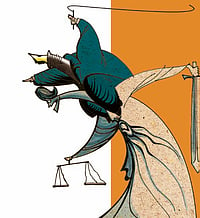There is a line in Hanif Kureishi’s new book The Last Word where the protagonist, a fictional cutout of V.S. Naipaul, observes that “every age has a central philosophical issue.... Ours will be revival of religion as politics”. He may well have been referring to the toxic mix of religion and politics that has marked the Indian election campaign—ironically in the name of secularism caught up between its ‘pseudo’ and ‘genuine’ champions. Well, I’m in the ‘pseudo’ camp for the simple reason that Narendra Modi and the BJP’s notion of ‘genuine’ secularism is too fuzzy for me to get a handle on it; and—as I’ll argue in a bit—it is, in fact, a cover for a more troubling agenda.
For those of us who believe that, despite all its flaws, an interventionist state secularism remains the only sensible way of managing India’s often disorienting cultural diversity, there has been little to cheer about in this election. We have seen the old national consensus around the ‘Nehruvian vision’ break down in the face of a determined and aggressive assault by a resurgent Hindu Right. Even minorities, disillusioned with its abuses, don’t subscribe to it any more. It’s with hesitation now that people use the term ‘secularism’ lest they be derided for speaking the language of ’50s India. Some have even suggested it should be ditched for a more ‘neutral’ term like ‘diversity’.
It’s frightening how easily the majoritarian discourse can drive out democratic opinion. What started as a debate on the nature of Indian secularism has turned into bullying. TV anchors have taken to ordering studio audiences to raise their hands if they believe secularism has worked. Few hands go up as people exchange glances and ponder whether it would be prudent to stand up and be counted for a lost cause. After 60 years, it is perhaps time to look at the Nehru model afresh. The problem is, its opponents have already declared its demise, want no debate and instead wish to impose their own version dressed up as “genuine secularism”.
But many believe this is a red herring; what Hindu nationalists may really be playing with is the idea of Israeli-style “ethnic democracy” in which the supremacy of the dominant ethnic group (Jews in Israel’s case) is institutionalised while keeping up a pretence of equal rights for all ethnicities.
There is a view among some Western scholars, though contested by others, that even the framers of the Constitution were influenced by ethnic considerations; that’s why the term “secularism” was not included in the original preamble, and caste-based reservations were restricted to Hindus alone. (The term ‘socialist secular’ was, in fact, inserted by the Indira Gandhi government in 1976 through the contentious 42nd amendment.)
According to Prof Gurharpal Singh of the School of Oriental and African Studies in London, who has done a lot of work on ethnic conflict in India, the whole constitutional provision relating to caste-oriented reservations appeared to have been designed to reinforce the idea of Hindu hegemony. It was sought to be justified on grounds that caste discrimination was a uniquely Hindu problem; the more “egalitarian” religions like Islam, Christianity and Sikhism did not have a caste system, and hence needed no reservations.
But few suggest that in doing so the Constitution-makers were motivated by majoritarian instincts. They are seen to have genuinely believed in the idea of equal citizenship while acknowledging the dominant status of Hindus in order to appear fair to both sides in the febrile atmosphere of post-Partition tensions. The same though cannot be said about the BJP’s instincts, given its record of minority-bashing.
If the BJP comes to power, as seems likely, little might change on the surface but the fear is that gradually the arrangements that offer protection to minorities will be eroded in the guise of genuine secularism. The Gujarat government’s refusal to implement a free scholarship scheme for Muslim students on grounds that it favours a religious group is an example.
So, the BJP needs to come out with a better definition of its vision of a “genuinely secular” India to allay fears that what it is proposing is, in effect, a prescription for an even more socially and economically divisive society than Congress-style secularism has landed us with. The old consensus may have broken down amid a growing yearning for a change, but what kind of change? That question remains to be answered.
This election campaign has been described as the most polarised in recent memory, but it will still have been worth it if, in the end, it helps the nation achieve a degree of clarity around a collective—as opposed to an exclusivist BJP—vision of 21st-century India. Alas, there is no sign of it yet.
Hasan Suroor is the author of India’s Muslim Spring: Why is nobody talking about it?

























